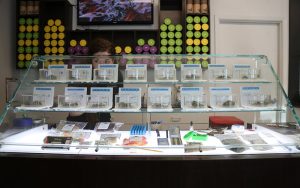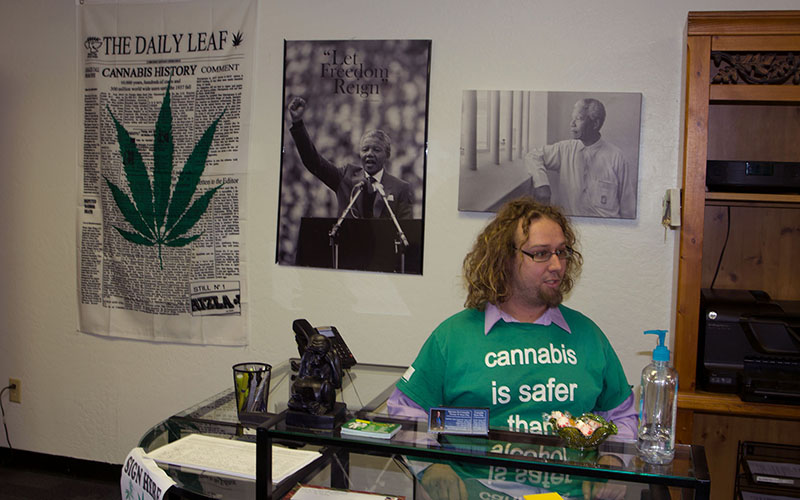PHOENIX – Nirvana Center, a medical-marijuana dispensary in Phoenix, sells products with such names as ice cream, bubble gum and vanilla bean – shying away from using harsher-sounding traditional names.
“People definitely are becoming more accepting of cannabis and its uses,” said Max Schell, who helps run the center’s marketing team. “And I feel like when people see names like Green Crack or Herijuana, it kind of throws them off.”

Dispensaries carry many cannabis products – from flower and “wax” to cookies and infused tea. (Photo by Jessie Wardarski/News21)
The industry’s marketing efforts have matured since Arizona voters legalized marijuana for medical use in 2010, industry experts said. In addition to introducing “softer” terms to describe their products, dispensaries now offer such conveniences as online ordering and delivery. And many dispensaries display their products in neat rows along well-lit shelves, much like you’d see at a trendy boutique.
Some dispensaries are moving to offering holistic wellness experiences for their patients, said Sara Gullickson, founder and CEO of Dispensary Permits, a Scottsdale cannabis consultant.
“Many dispensaries are creating a community around their brand through messaging and services or products they offer,” she said via email. “Some facilities are offering yoga, massages and/or hosting wellness events on the weekends to encourage non-patients who may be interested in healthier lifestyle options or to give their existing patients an ‘add value.’ ”
The goal: Reduce the taboo long associated with marijuana use and make people more comfortable walking into a dispensary to buy marijuana.
Dispensaries must register with the state and operate as nonprofits.
The state caps the number of dispensaries that can operate in Arizona. The nearly 100 nonprofits open here sold more than $340 million worth of marijuana in Arizona in 2016, according to the National Cannabis Industry Association. The association projects that number to rise to $524 million in 2021.
A recent Pew Research Center survey indicated that Americans have changed their attitudes about marijuana over the decades. About 61 percent now say the use of marijuana should be legalized, compared with about 12 percent in 1969.
At Nirvana, the products may appeal to consumers in a variety of ways – from tempting taste buds to promoting health benefits. The edible offerings range from strawberry cheesecake truffle and vanilla birthday-cake pudding to black cherry-bomb soda and white Cheddar popcorn. And some concentrates market themselves as treating muscle and joint pain and call themselves medicinals.
Some patients welcome the changes, saying the consumer friendly terminology helps destigmatize the industry.
Kaleigh Whitham, a new patient at Nirvana Center, said many of her family and friends initially were critical of her choice to try medical cannabis to relieve back pain. She said, however, that some of their old stereotypes about marijuana have begun to soften as she has shown them the products she bought from Nirvana Center.
“The disconnect of an actual drug that you don’t necessarily want to take, but replacing it with a name that’s kind of fun and, you know, kind of cool, definitely helps,” she said.
Subscribe to Cronkite News on YouTube.
